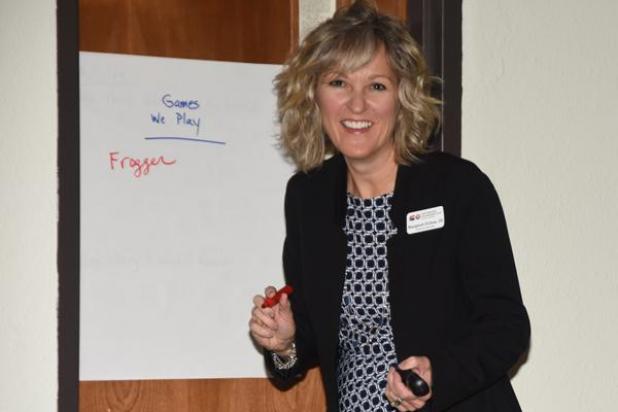
Margaret Ochoa, J.D., child sexual abuse prevention specialist from the Colorado School Safety Resource Center, interacts with youth as they answer questions at her “Safety in the Age of Social Media” presentation at the school last Thursday evening. — The Holyoke Enterprise | Johnson Publications
Safety in the age of social media requires education for everyone
Gaming and social media were clearly areas that kids in the Holyoke audience were well aware of at the Oct. 10 presentation of “Safety in the Age of Social Media.”
Working with Holyoke School District, Margaret Ochoa, J.D., child sexual abuse prevention specialist from the Colorado School Safety Resource Center, shared valuable information for parents and students. The resource center is part of the Colorado Department of Public Safety.
More than 50 people, including a number of elementary-age youth, took part in the presentation at the JR/SR high library. Students in grades 4-12 were encouraged to attend with their parents.
Addressing the youth in the crowd, Ochoa showed gaming apps and mobile devices as the youth displayed their knowledge by quickly shouting out the identity of the images.
They had a good grasp of some of the advice for safety in gaming and social media usage, and they learned more.
— Don’t talk to strangers.
— Don’t give out any personal information.
— Be careful which games you play.
— Leave the game if someone starts using bad language.
— You can mute people so you can’t hear them talk.
— Make a rule to only play with those you know.
With reference to the kids’ knowledge, Ochoa adamantly said, “Parents — lean into social media and get comfortable. It’s not going away. Navigate this water with your kids.”
Ochoa referenced a contract she has had with her own kids, who are now 17 and 20. If they violate the contract, they lose privileges. One contract area includes parental permission for each app usage.
Additionally, Ochoa advocates for leaving devices with parents and not sleeping with cellphones.
Bullying is one thing that youth can encounter on social media and gaming. Ochoa highlighted some differences between normal conflict and bullying. “A bully won’t retreat — they never go away,” she emphasized. She added that cyberbullying is just bullying online.
Cyberbullying Research Center defines it as “willful and repeated harm inflicted through the use of computers, cellphones and other electronic devices” (from Bullying Beyond the Schoolyard: Preventing and Responding to Cyberbullying).
Ten tips for teens for cellphone safety were identified in a handout, and its source, cyberbullying.org, was recommended by Ochoa.
Kids in Thursday’s audience had immediate answers for Ochoa’s question about the current “hot” apps. “YouTube, TikTok, Snapchat, Facebook,” they said.
Twitter was at the top of “What’s hot” apps in 2010. An interesting visual showed the top 15 apps and how they changed ranking each year through 2018. Facebook has remained at the top for several years, and TikTok is hot right now.
Snap Map is a feature in Snapchat that shows where the user is and what he’s doing. Ochoa said the map can be put into ghost mode, and locations can be turned off for security.
“The most popular apps where kids get into trouble are Facebook, Instagram and Snapchat,” Ochoa said, citing the high numbers of people using them.
Kids had good answers when asked what to do if someone that they don’t know messages them on Instagram. “Don’t answer; delete; or tell an adult,” they said.
“You’re never really secure on social media,” Ochoa pointed out.
Privacy settings were emphasized as steps toward security. “And never load an anonymous app,” Ochoa said emphatically.
“Make sure you’re not lazy — do the security things — it really does matter.”
She emphasized using different usernames and passwords instead of the same ones for everything. And keep cameras covered, as hackers can hack your computer camera.
But as we enter the world of social media, Ochoa encouraged those present not to just think of the negative. “Be aware of opportunities to put positive social images out there too,” she added.
She referenced how hurtful people’s posts can be to themselves due to their permanence. Every image taken on Snapchat is maintained on the Snapchat server. “Every image you took can be retrieved, even if it’s deleted from the cloud,” Ochoa warned.
As a result, “Always think before you post,” she said.
There are minimum ages for usage of particular apps. However, these were established by developers of social media. Ochoa referenced a website, com monsensemedia.org, as its recommendations for age usage are a little older.
New laws for juvenile sexting
Juvenile sexting, or sharing of explicit images on mobile devices such as cellphones, saw a law change in 2018.
Offenses went from mandatory felonies to a tiered charging structure. In the new language, some offenses are still felonies, while others can be misdemeanors, petty offenses or civil infractions for those under the age of 17.
Ochoa offered solutions for this. “Never ask anyone for an image. If someone asks you, say, ‘I can’t,’ ‘I won’t,’ ‘My parents won’t allow it’ or something similar. Block them and tell an adult.”
Ochoa advised parents to engage the school. Ask your kids, “Who are three people at the school who you would go to if you’re in trouble?”
“And kids — understand that your parents want to help you first, want to keep you safe first. We’re here to help and keep you safe.”
More sessions coming
Holyoke Superintendent Kyle Stumpf noted that the district’s teachers and coaches have been working with Ochoa over the last year. Last week’s was the first of hopefully four programs that they plan to have Ochoa bring to the district this school year.
He anticipates there will be one more before Christmas, another in January and a final one in March.
